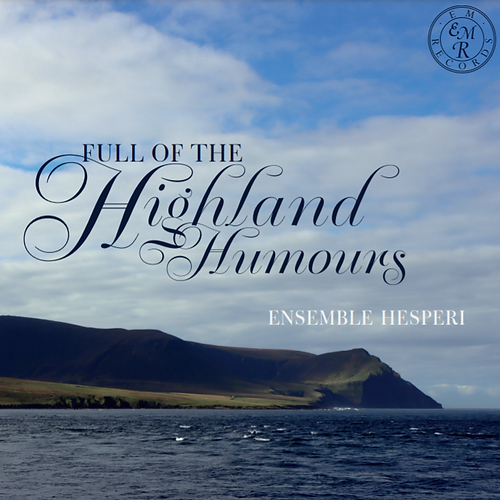James Oswald
The Airs for Spring: The Ranunculus
The Airs for Summer: The Poppy
The Airs for Autumn: The Sweet Sultan
The Airs for Winter: The Cyclamen
A Curious Collection of Scots Tunes:
Alloway House, O Mother What Shall I do, Ettrick Banks, She Rose And Let Me In, Cromlit’s Lilt, Polwart On The Green
Sammartini
Trio Sonata VI
Nicola Matteis
Ground after the Scotch Humour
Thomas Erskine, Earl of Kellie
Sonata IV for 2 Violins & Bass
Henry Playford
Peggy’s The Prettiest – My Lady Hope’s Scotch Measure
Geminiani
Sonata III: The Last Time I Vame O’er The Moor
Robert Bremner
Maggie Lauder
Hit Her On The Bum

Ensemble Hesperi
Mary-Jannet Leith (Recorders)
Magdalena Loth-Hill (Violin)
Florence Petit (Cello)
Thomas Allery (Harpsichord)
EM Records EMRCD074
Full Price
The Review
I was surprised to find I had a tenuous personal connection to one of these pieces, in that I spent several childhood summers at Kilravock Castle, hard by Culloden, where some of the music of Thomas Erskine was discovered in manuscript.
It is exactly the sort of place, a mediaeval fortress transformed into an elegant mansion, where one would have heard or played these tunes; the Rose clan chiefs in Kilravock like many others of their ilk unhappy about but accepting of the defeat of the Jacobite cause and wanting to maintain their sense of being gentry up with the times, in what Mary-Jannet Leith rightly describes as “a rather chaotic ideological context”. It is a context that is still current, veering between cultural nationalism and political ambivalence, resenting London but still keen to use its cosmopolitan advantages.
Esrkine was an ornament of Edinburgh music life, as were Oswald and Bremner until they moved to London and opened shops on the Strand (as Lorenzo da Ponte did a few years later). The programming on the record (well explained by Leith) is both fascinating and a coherent pleasure. The period instrument playing by the quartet is neither showy nor aggressive. There is domestic melancholy in the music, that hint of regret so often found in Scottish culture, and even in the Italian works the sunshine is shrouded. Bremner’s splendidly un-politically correct final number is one of the few Scottish tracks where zest overcomes decorum – all very Protestant; one can’t quite imagine any of the present generation going in for that sort of thing.
Recorder playing can be variable in tuning but Leith’s is not. She catches that authentic halfway sound between pipe and flute and her tone is constant. Magdalena Loth-Hill’s violin is consistently sweet and she uses the instrument’s expressive legato to supplement well the clean dynamics of the more dominant recorder. If there is nothing startling about this music it is full of character.
SM
